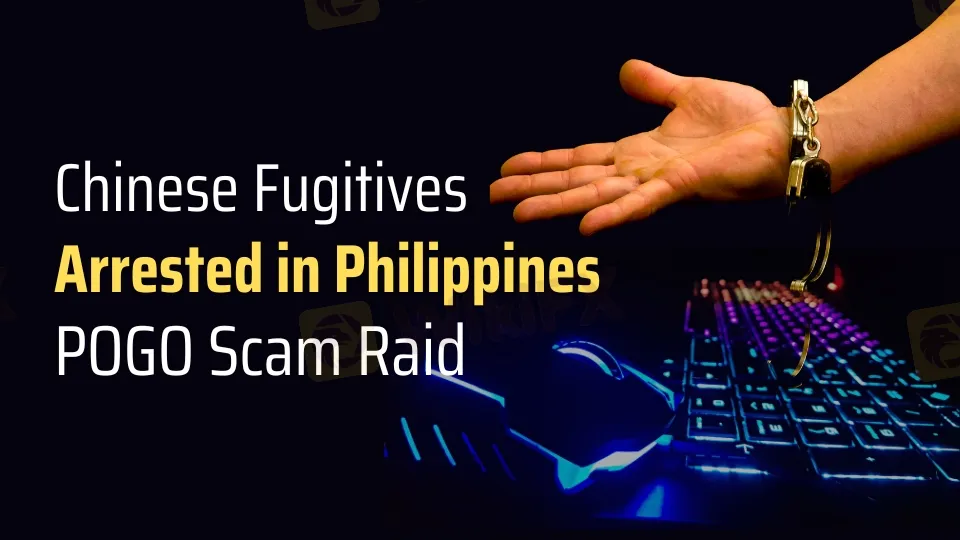简体中文
繁體中文
English
Pусский
日本語
ภาษาไทย
Tiếng Việt
Bahasa Indonesia
Español
हिन्दी
Filippiiniläinen
Français
Deutsch
Português
Türkçe
한국어
العربية
Chinese Fugitives Arrested in Philippines POGO Scam Raid
Abstract:Thirteen Chinese fugitives linked to POGO scams arrested in Pasay, Philippines. PAOCC reveals their crimes, raising concerns over illegal entry despite the ban.

In the Philippine Offshore Gaming Operator (POGO) scam hub in Pasay City, Philippines, authorities arrested thirteen Chinese citizens who turned out to be fugitives from their home country. The raid has unveiled a troubling web of transnational crime, spotlighting the persistent challenge of illegal POGO operations in the Philippines.
Raffy Tima reported on GMA‘s “24 Oras” that the Chinese Embassy confirmed the identities and criminal records of these individuals after the Presidential Anti-Organized Crime Commission (PAOCC) provided their names. PAOCC executive director Gilbert Cruz explained, “Ganiyan ang ginawa ng Chinese Embassy, kinuhaan nila ng biometric and then naglabasan na yung mga totoong pangalan nitong mga ’to, and then yung criminal activities nila lumabas na rin doon.” Translated, he meant that biometric checks revealed their real identities and exposed their shady pasts.
These Chinese fugitives are wanted for orchestrating cryptocurrency and investment scams, using a banned messaging app to run their illicit schemes. Their presence in the Philippines, despite a nationwide POGO ban, has left authorities baffled and concerned. Cruz pointed out a glaring security gap: “Especially those with red notice or may blue notice or wanted ng Interpol, automatic pagpasok dito niyan nagre-red alert na agad eh. Since wala silang dokumento nung pumasok dito, malamang puwedeng nag-back door sila or they used other means to get in our country.” In simpler terms, these wanted individuals likely slipped through undetected, possibly via unofficial routes.
The PAOCC is now working closely with the Bureau of Immigration to trace how these fugitives bypassed border controls. The investigation aims to plug these loopholes and prevent further breaches. Adding to the complexity, some foreign workers who fled earlier POGO raids in Bamban, Tarlac, and Porac, Pampanga, have resurfaced in smaller scam hubs in Pasay. This migration of illegal operations underscores the difficulty of stamping out POGO-related crimes entirely.
For now, the PAOCC‘s top priority is deporting these Chinese fugitives back to face justice in their homeland. The arrests highlight a critical issue: despite the Philippines’ efforts to shut down POGOs, determined criminals continue to exploit weaknesses in the system. The Pasay raid serves as both a win for law enforcement and a wake-up call to tighten security measures. As the backtrack investigation unfolds, Filipinos await answers on how these fugitives managed to infiltrate the country—and what it will take to stop it from happening again.

Disclaimer:
The views in this article only represent the author's personal views, and do not constitute investment advice on this platform. This platform does not guarantee the accuracy, completeness and timeliness of the information in the article, and will not be liable for any loss caused by the use of or reliance on the information in the article.
Read more

Never Heard of Dynasty Trade? Here's Why You Should Be Worried
Have you heard this name before? No , it’s time you do because staying unaware could cost you. This platform is currently active in the forex trading and has been linked to several suspicious activities. Even if you’ve never dealt with it directly, there’s a chance it could reach out to you through ads, calls, messages, or social media. That’s why it’s important to know the red flags in advance.

Want to Deposit in the EVM Prime Platform? Stop Before You Lose It ALL
Contemplating forex investments in the EVM Prime platform? Think again! We empathize with those who have been bearing losses after losses with EVM Prime. We don't want you to be its next victim. Read this story that has investor complaints about EVM Prime.

WEEKLY SCAM BROKERS LIST IS OUT! Check it now
If you missed this week's fraud brokers list and are finding it difficult to track them one by one — don’t worry! We’ve brought together all the scam brokers you need to avoid, all in one place. Check this list now to stay alert and protect yourself from fraudulent brokers.

Catch the Latest Update on BotBro & Lavish Chaudhary
BotBro, an AI-based trading platform, became popular in India in 2024—but for negative reasons. Its founder, Lavish Chaudhary, who gained a huge following by promoting it heavily on social media. Since then, he has become well-known, but for many controversies. Let’s know the latest update about Botbro & Lavish Chaudhary.
WikiFX Broker
Latest News
Global week ahead: Crunch time for trade talks as Trump's deadline nears
Top Wall Street analysts recommend these dividend stocks for regular income
Stock futures rise as U.S.-EU trade deal kicks off a hectic week for markets: Live updates
Samsung Electronics signs $16.5 billion chip-supply contract; shares rise
Does XS.com Hold Leading Forex Regulatory Licenses?
Elon Musk confirms Tesla has signed a $16.5 billion chip contract with Samsung Electronics
Chile Bumps Up Copper Price Forecast and Flags Lagging Collahuasi Output
European stocks set to rise after the U.S. and EU strike trade agreement
EU chief to meet Trump in Scotland in push to avoid a transatlantic trade war
Anglo American Q2 2025 Production: Copper and Iron Ore Excel
Currency Calculator



